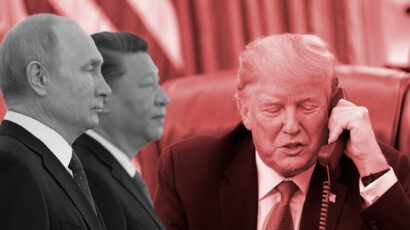Where women warriors will lead
By Hugh Gusterson | January 31, 2013
The announcement that the Pentagon will open combat positions to women marks the third great turn toward integration and equality in the history of the US military. The first came in 1948 when President Harry Truman ordered racial desegregation of the armed forces. Thanks to Truman, we now accept a situation that was deeply troubling to some at the time: white soldiers serving under black officers. The second integrationist turn came with the decision, initiated by President Clinton and finalized under President Obama, to allow gay men and women to serve in the military.
The announcement that the Pentagon will open combat positions to women marks the third great turn toward integration and equality in the history of the US military. The first came in 1948 when President Harry Truman ordered racial desegregation of the armed forces. Thanks to Truman, we now accept a situation that was deeply troubling to some at the time: white soldiers serving under black officers. The second integrationist turn came with the decision, initiated by President Clinton and finalized under President Obama, to allow gay men and women to serve in the military. And now it is women’s turn for full equality. As a result of Secretary of Defense Leon Panetta’s January 24th announcement, within a few years it will be normal to see women leading men into combat, serving on the Joint Chiefs of Staff, and returning to the United States in flag-draped coffins as their tearful husbands comfort their children.
As well as resolving the debate about the role of women in combat, Panetta’s announcement will reverberate well beyond war zones. For example, it will have implications for a longstanding tension between antiwar feminists and those I have called “feminist militarists.” In the 1980s, antiwar feminism seemed to have the upper hand. These were the years of women-only peace camps at Greenham Common and Seneca Falls, and an antinuclear movement led largely by women such as Helen Caldicott, Randall Forsberg, Jessie Cocks, and Pam Solo. In a decade in which Carol Gilligan’s argument that women reason about right and wrong “in a different voice” held sway in women’s studies programs, many feminists took it for granted that militarism was an expression of patriarchy and that feminism was necessarily anti-military. But at the same time a different kind of feminist, typified by Congresswoman Pat Schroeder, was arguing that it was time to smash the glass ceiling in the military and let women fight in combat. While this is a breakthrough in terms of equal opportunity, casting women as fighters signals the eclipse of what had been a powerful ground for critique of the military.
The feminist historian Angela Woollacott has argued that there is “an equation between citizenship and war service.” Marginalized communities have historically pressed their claims for the full rights of citizenship by fighting and dying for the nation-state, she observes. Parachuting behind enemy lines, busting into villages brandishing M-16s, and having limbs blown off will do more to confer full equality on women than chairing the university physics department or leading a federal agency. But as women claim the full rites of military citizenship, defining feminism as the equal opportunity to kill and be killed, yet another sector in our society will have succumbed to the warrior ethos.
It’s possible that military integration for women would have carried a different meaning had it been done by President Clinton, when the United States was heavily involved in peacekeeping missions and not fighting a land war. It is possible that, in such a context, it might have been framed by the media as a way to introduce skills like mediation and conflict resolution into the military toolkit, giving the military a feminine edge. Instead, coming at the end of a decade of brutal counterinsurgency warfare, coverage of Panetta’s decision has foregrounded hard-charging women irked to have been denied the opportunity to prove themselves in combat. It has been seen as a move that signals the masculinization of women rather than the feminization of the military.
Much of the media commentary on Panetta’s announcement has focused on the question of whether women will be as capable as men in combat, and whether their physique will put them at a disadvantage. The answer to this seems obvious enough: Just like men, some women will fight with extraordinary tenacity and courage, and some will discover that they do not have the grit they hoped they had. Physique will not have a lot to do with it. (I once saw General David Petraeus speak, and I was astonished at how physically slight the great general was.) The real mystery is not whether women are capable of combat, but whether their male colleagues are able to accept that they are capable of combat.
It seems to me that the more interesting questions concern the larger ramifications of the decision. First, the question teenage girls all over the country are surely asking: Does this mean that high school girls will, like boys, have to register for the draft? Or will we retain a residue of sexism by making formal availability for combat optional for women but obligatory for men? According to the Washington Post, the Department of Defense has, astonishingly, given almost no thought to this question. (Leon Panetta seems to have thought through the integration of women about as thoroughly as Donald Rumsfeld thought through the occupation of Iraq.)
Second, what are the implications for the epidemic of sexual assault in the contemporary US military, recently detailed in the documentary film The Invisible War? Some commentators have suggested that women will be less likely to be assaulted by male colleagues if they have equal status as warriors. This is surely wishful thinking. While the slow rise of women through the ranks to senior positions may force the military to take sexual assault more seriously, it will remain a serious problem as long as the military is full of young men and women thrown together in intense situations with lots of alcohol and too little supervision, especially if women continue to be portrayed as sex objects in the wider culture.
In his fascinating book Bring Me Men, the political scientist Aaron Belkin suggests that, in the Naval Academy at least, as many men as women are sexually assaulted by men, usually by men who identify themselves as straight. The fact that they can fight in combat has not protected the victims from rape. Belkin suggests that it is too simple to see sexual assault in the military as an issue of just men raping women; instead, in a way that brings to mind prison rape, some men turn others into symbolic women by means of sexual assault. According to Belkin, if we bring the silent epidemic of male-on-male rape into focus, we see that sexual assault in the military is as much about the enforced performance of the roles of male and female as it is about the actual raping of women by men. The admission and promotion of more women in the military may do little to change that. It may even produce a new genre of assault: between women.
Finally, one wonders about the implications of Panetta’s announcement for the largely invisible system of free labor the armed services extract from military wives. As the prolific feminist author Cynthia Enloe has explored in a series of books, these women are expected to sacrifice their own careers to their husbands’ endless relocations to new bases, to raise children alone while their husbands are deployed abroad, to earn enough money that the family can get by on the meager salaries paid to the lowest-ranking soldiers, to organize social events for other military wives, and to provide care and support to spouses returned from the battlefield with psychiatric wounds. One wonders what will happen to this gendered gift economy now that women have been offered full equality within the military. Will the husbands of women warriors, unwilling to accept the dutiful subordination of military wives, insist that military spouses be treated better? Will the enhanced power and prestige of women in the military rub off on women married to the military? Or will the exploitation of military spouses simply become an equal opportunity affair? And can we soon expect a tasteless cable television series called “Military Husbands”?
With little fanfare, and surprisingly little backlash so far, Panetta has announced a decision with enormous implications for the US military and for gender relations in the wider society. The full consequences will surely take many years to become apparent.
Together, we make the world safer.
The Bulletin elevates expert voices above the noise. But as an independent nonprofit organization, our operations depend on the support of readers like you. Help us continue to deliver quality journalism that holds leaders accountable. Your support of our work at any level is important. In return, we promise our coverage will be understandable, influential, vigilant, solution-oriented, and fair-minded. Together we can make a difference.
Topics: Columnists, Nuclear Weapons















